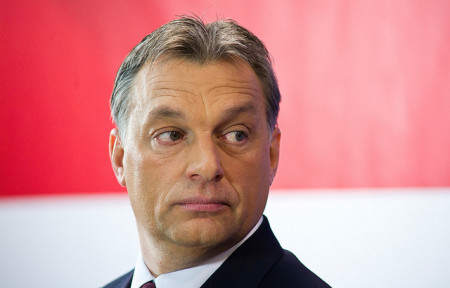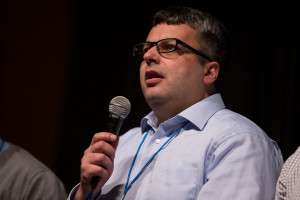By Damaris Colhoun July 14, 2015

Hungarian Prime Minister Viktor Orbán ©Európa Pont
Hungary’s independent media is in turmoil. Amid allegations of widespread political corruption, and as advertising revenues in journalism have collapsed, the government has placed a systematic chokehold on the press, according to media watchdogs and journalists.
They charge that the state has bought up media companies on the cheap and, having become the biggest advertiser in a tiny market, put pressure on others through its advertising dollars. Meanwhile, Prime Minister Viktor Orbán has de facto control of the nation’s Media Authority, which allows him to squeeze critical media through a system of fines and taxes, collect sensitive information from media companies, and regulate editorial content, the New York Times reports.
Against this backdrop, veteran Hungarian journalists have launched a couple of non-profit investigative journalism startups to expose high-level government corruption and the misuse of public funds. Atlatszo.hu was rolled out in 2011 by Tamas Bodoky, and is focused closely on reporting about what is known as “state capture,” in which a handful of elite business oligarchs with close ties to the government win lucrative state contracts, buy up media outlets and influence party financing, giving them significant influence over the state’s decision-making processes. (Watchdog groups consider state capture a pervasive problem in Hungary.)
One recent Atlatszo story charged that companies with connections to Prime Minister Viktor Orbán are making billions on a public procurement deal to update the city’s streetlights to LED technology. It also described how the project was set in motion by municipalities backed by the ruling political party Fidesz, which currently enjoys a two-thirds majority in parliament.
Direkt36.hu, another non-profit investigative newsroom, in the spirit of ProPublica but with a focus on government corruption, published its first story this January. That story suggested that Prime Minister Orbán is funneling European Union development funding into the pockets of family and friends, at a moment when he is openly critical of EU sanctions against Russia, and is closely aligned with Putin.
These are the kinds of stories that could take down a politician in Western Europe or the U.S. But in Hungary, where corruption seems to be woven into the fabric of local elections and laws, and the Prime Minister has declared his intentions to “build an illiberal state,” their impact is harder to measure.
“We found out that a lot of money goes to companies that have ties to the governing party, but it’s very difficult to prove that it was somehow manipulated or biased because it’s all ‘legal,’” said Bodoky, Atlatszo’s founder and editor. “So you cannot say ‘corruption.’ You can only say, ‘Why is this company making so much money?’” Atlatszo’s next story will delve into a recent decision by parliament to classify the financial details of a controversial nuclear deal with Russia, Hungary’s main trading partner outside of the EU—unless the EU blocks it first.
As someone who agitated for democracy throughout the 1980s, when Hungary was a part of the Soviet sphere, and news articles were photocopied and distributed covertly, Bodoky is deeply concerned about Russia’s increasing influence on Hungarian political life. “Orbán used to be against the Russians. Now he’s into the Russians…Meanwhile his government is not respecting the division of power between branches. They want to pick up all branches of power and fill it with party loyalists. They own media. They own everything. This is a worrying situation.”
Another major concern is the problem of censorship. Bodoky said he left his previous job at Index, a mainstream news outlet where he was a lead investigative reporter, to found Atlatszo because he was pressured not to write about certain banks and companies.
“The last thing I published was about Viktor Orbán sitting on a VIP stage of a football stadium with some well known businessmen. Some of these businessmen called the owner of Index, and then he called the chief editor. The article was published and after a few hours a key paragraph was edited out.” The businessmen in question are the presidents of a major bank and oil and gas company in Hungary, and have close ties to Fidesz.
Direkt36 was conceived under similar circumstances. Last spring, Gergo Saling, editor-in-chief from one of Hungary’s biggest news outlets Origo, was let go after the site published a series of critical reports about the Hungarian government. One of those reports addressed Secretary of State Janos Lazar and his alleged multimillion-dollar travel expenses. Critics accused the Hungarian government of taking advantage of its cozy relationship with Deutsche Telekom, which owns Origo, to silence news organizations that are critical of it. Meanwhile, dozens of journalists quit Origo in solidarity with Saling, including Andras Petho, who wrote the report on Lazar. Saling, Petho and Balasz Weyer, one of Origo’s founders, then launched Direkt36 together.
To Weyer, what happened at Origo is part of a broader pattern that’s occurring across the region. “In the Czech republic and Slovakia, the best media outlets have been bought up by these oligarchs, and whole newsrooms got up and left, and they all launched something new. So these stories are very familiar and we’re talking with them about doing something together,” Weyer said, adding wryly that the environment for independent journalism may now in fact be healthier in the Balkans.

Tamas Bodoky, editor in chief of Atlatszo. ©Knight Center for Journalism in the Americas
“There are lots of donor resources available—US sources, EU sources, global donor sources—in places like Sarajevo and Kosovo… Investigative journalism in the Balkans is a focus for all these donor projects, so the genre has more support there.” But in Hungary, Slovakia, and the Czech Republic, he said, donors think it’s not needed anymore, because these countries are now members of the EU. Many people think EU membership means the problems of corruption have been resolved, he said.
Meanwhile, in Hungary, a law passed in 2011 requires all media outlets to register with a media-control body, whose members are appointed by the leading party in parliament. The law has been widely criticized. Saling said it has yet to affect his daily life as a journalist, but that it’s an important symbol of the government’s hostility towards the press and could eventually have tangible effects on his ability to produce independent journalism.
Amid these political and economic pressures, both Atlatszo and Direkt36 are experimenting with non-profit funding models in an effort to maintain their independence. Atlatszo’s website, equipped with a platform that enables sources to leak confidential documents and tips while remaining anonymous—a feature that Bodoky describes as crucial in Eastern Europe, where journalists often lack official access to public information—has been kept afloat by a steady stream of public donations. With anywhere from 10,000 to 30,000 unique visitors per day, the site raised close to $100,000 last year, the greatest sum it has raised in its four years of operation.
“I guess that’s the readers response to government attacks,” Bodoky wrote in email.
Meanwhile, after garnering as many as 131,000 unique visitors in its first two weeks online, Direkt36 raised close to 34,000 Euros in February through its first crowdfunding campaign, exceeding its goal by 14,000 euros. Weyer said he was pleased with the results, but that the model has its challenges. For one, the site risks dipping in the same pool of readers that Atlatszo relies on for funding, even as it tries to differentiate its mission and content from Atlatszo’s. For another, Weyer worries about putting the site’s bottom line in the hands of an audience who has a historical mistrust of journalists, and for whom investigative journalism is a relatively new phenomenon.
“The biggest issue with crowd-funded media is how you manage the expectations. When people are directly contributing, their expectations go up, and probably many people expected that after our first story someone would go to prison, because that’s what they expect,” Weyer said. No one did.
And then there is the fact that investigative journalism is notoriously time- and labor-intensive. To report its first story, a systematic examination of how Prime Minister Orbán, his son-in-law and companies in their orbit are profiting from deals that are mean to benefit the public, Direkt36 ran into a number of roadblocks. The most significant of these involved the government database, which Andrasz described as “dirty” and difficult to navigate. It’s designed to intimidate journalists, he said. For example, its documents can’t be exported, so the reporters had to write their own code in order to manually scrape them off the site. Then, because the data was potentially tampered with or fudged, the reporters had to cross check it with local research groups such as Central European University and Transparency International.
In a country where investigative journalism and freedom of the press are still nascent and fragile concepts, Petho hopes his method will win the hearts and minds of readers. “The story was known by many, but you couldn’t really say it as a fact. In order to present it as a fact you had to go through the documents and structure the information,” Petho said. “A lot of stories in Hungary are labeled investigative, but they’re not,” he said, because they don’t dig deep enough, or shy away from hitting powerful people as hard as they should. “This was supposed to be a case study in independent investigative journalism. It was supposed to send a message to Orban’s government.”
This entry was posted on Tuesday, July 14th, 2015 at 1:58 pm. It is filed under investigative journalism, On the Beat and tagged with Andras Petho, Atlatszo, Balasz Weyer, Direkt36, Gergo Saling, Janos Lazar, Tamas Bodoky, Viktor Orbán. You can follow any responses to this entry through the RSS 2.0 feed.

Hungary is an enigmatic country to be sure. Sixteen years living in the provinces has shown me that. Accepted western mores remain mere concepts to most Hungarians who live shady worlds of suspicion and fear. Just a few points: there are no specified penalties for academic cheating at any level of education. It is tolerated and in some ways fostered. Being a student leader is a job. The president of the Szeged University student council has been in the job for ten years and makes a huge salary. Hungary is the largest kleptocracy in Europe today.